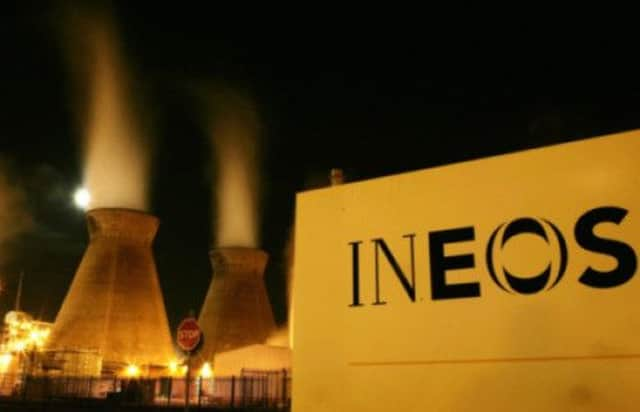Grangemouth warning as factory shuts


Chemicals giant Ineos said one of its divisions, a paint and glue factory in Hull, had been taking up to 20 per cent of Grangemouth’s ethylene but it could no longer compete with lower-cost raw materials being imported from the United States and Saudi Arabia.
The company said the loss of the contract highlights the precarious position of the petrochemicals plant at Grangemouth, which employs about 800 workers.
Advertisement
Hide AdAdvertisement
Hide AdThe latest development comes as a trade union official accused the management of “playing Russian roulette” with Grangemouth’s future, saying workers feel like they are being provoked into a strike.
Unite’s Scottish regional secretary Pat Rafferty said the union approached management last year with an offer to negotiate on cutting its pensions bill and remains prepared to “sit down and discuss” issues with the company.
An industrial dispute was already brewing when owner Ineos announced its “survival plan” for the Grangemouth petrochemicals factory last week, with an overtime ban and work to rule set to be implemented tomorrow.
The action is in support of Stephen Deans, an employee and union official who was involved in the controversy to select a Labour candidate to replace the disgraced Falkirk MP Eric Joyce. Deans was cleared of wrongdoing by both the police and the Labour Party and a suspension imposed on him was lifted. However, a firm of lawyers is investigating claims by management that he used company time and resources on non-company business.
Rafferty said Ineos was “trying to spin this dispute into a fight over the future of Grangemouth”. He said: “This is not the case, we have always been willing to sit down with the company and discuss the challenges facing the business.”
Rafferty also disputed Ineos’s claims that both the refinery and the chemicals plant are losing tens of millions of pounds every year. He said the company’s claims are down to “fancy accounting”. He said: “Using standard profit and loss, both sites are in profit.
“You can’t be playing that kind of Russian roulette with a site like Grangemouth. It’s far too important to the Scottish economy, and indeed the UK economy.”
Calum MacLean, chairman of the petrochemicals business, said a decision on whether disciplinary action would be taken against Deans would be known by 25 October.
Advertisement
Hide AdAdvertisement
Hide AdIn a statement issued on Friday, the company said it was writing down the value of the petrochemicals plant from £400 million to zero. MacLean described the business as “worthless” and repeated earlier messages that it would close by 2017 unless the union agreed to cost-cutting and the company received government support for a bank loan.
The refinery and the petrochemicals businesses together have lost £150m a year in each of the last four years and the pension scheme has a £200m deficit. The company wants to switch from a final salary pension to a cheaper money purchase scheme.
MacLean said the refinery is safe but the petrochemicals operation is threatened by the decline in available gas used in the process. The company wants to build a terminal at the site to import US shale gas. It has a similar plant planned in Norway.
A £300m investment in the petrochemicals business would return it to profitability, said MacLean. Of that sum, Ineos would provide £291m in direct funding and a government-guaranteed loan from the bank. The £9m balance would be in the form of a regional selective assistance grant.
SEE ALSO: